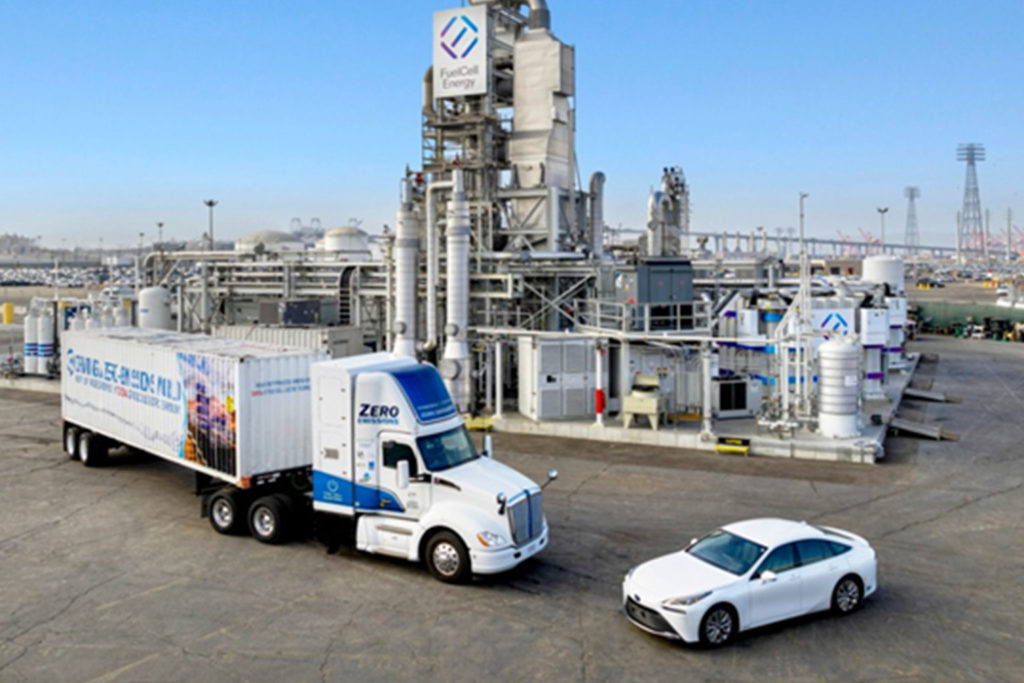Fuelcell Energy and Toyota: Pioneering the Future With the World’s First “Tri-gen” Production System
September 8th, 2023 by Fiedler Group
Introduction
On September 7, 2023, FuelCell Energy, Inc. (FCE) and Toyota Motor of North America (Toyota) unveiled the world’s first “Tri-gen system” at Toyota Logistic Services (TLS) Long Beach. This innovative energy solution, owned and operated by FCE, makes TLS the first port vehicle processing facility in the world powered by onsite-generated, 100% renewable energy. The “Tri” refers to on-site generation of renewable electricity, hydrogen, and water from biogas. A major breakthrough in the scalability of hydrogen-powered fuel cell technology, it promises to transform the way we power logistics and transportation facilities, signaling a pivotal moment in the journey towards cleaner energy. The Tri-gen system showcases the potential and economic viability of hydrogen-based energy production, offering inspiration for other industries and regions. Beyond its technological significance, Tri-gen symbolizes the power of collaboration and innovation in shaping a greener future amid the challenges of climate change.

Tri-gen: A Game-Changer in Sustainable Energy
This revolutionary system provides three key benefits:
- Renewable Electricity: Tri-gen produces 2.3 megawatts of renewable electricity, a portion of which will be used by Toyota Logistic Services (TLS) Long Beach to power its operations at the port. This marks the first time that a port vehicle processing facility is fully powered by onsite-generated, 100 percent renewable energy.
- Renewable Hydrogen: The Tri-gen system can produce up to 1,200 kg/day of hydrogen, meeting TLS Long Beach’s fueling needs for its incoming light-duty fuel cell electric vehicle (FCEV) Mirai. Additionally, it supplies hydrogen to a nearby heavy-duty hydrogen refueling station, supporting TLS logistics and drayage operations at the port. Hydrogen production can be adjusted based on demand, ensuring efficient resource utilization.
- Usable Water: As a byproduct of hydrogen production, Tri-gen generates approximately 1,400 gallons of water per day. This water will be utilized by TLS Long Beach for car wash operations, significantly reducing the use of local water supplies and promoting responsible water management.
Environmental and Community Benefits
Tri-gen’s impact extends beyond Toyota’s operations at the Port of Long Beach, including:
- Reduced Emissions: The Tri-gen system is expected to reduce over 9,000 tons of CO₂ emissions annually by providing carbon-neutral energy. It supports Toyota’s ambitious goals for emissions reduction.
- Cleaner Air: By avoiding more than six tons of grid NOx emissions annually, Tri-gen contributes to improved air quality, benefiting both the community and the environment.
- Reduced Diesel Consumption: Tri-gen enables the use of hydrogen-powered fuel cell trucks in port operations, potentially reducing diesel consumption by more than 420,000 gallons per year. This move toward cleaner transport aligns with global efforts to transition to zero-emission vehicles.
- Baseload Electric Generation: Excess electricity not used by TLS will be supplied to the local utility, Southern California Edison, under the California Bioenergy Market Adjustment Tariff (BioMAT) program. This addition to the electric grid further supports renewable energy adoption and enhances grid resilience.
Fiedler Group is proud to have been part of this important project, providing civil and foundation design and engineering services as well as permit processing. Since its founding in 1957, Fiedler Group has been a leading supplier of innovative design and engineering services committing to projects that revolutionize technologies, processes, and advancements.
To learn more how Fiedler Group can support your projects, please visit our website, or contact us here.